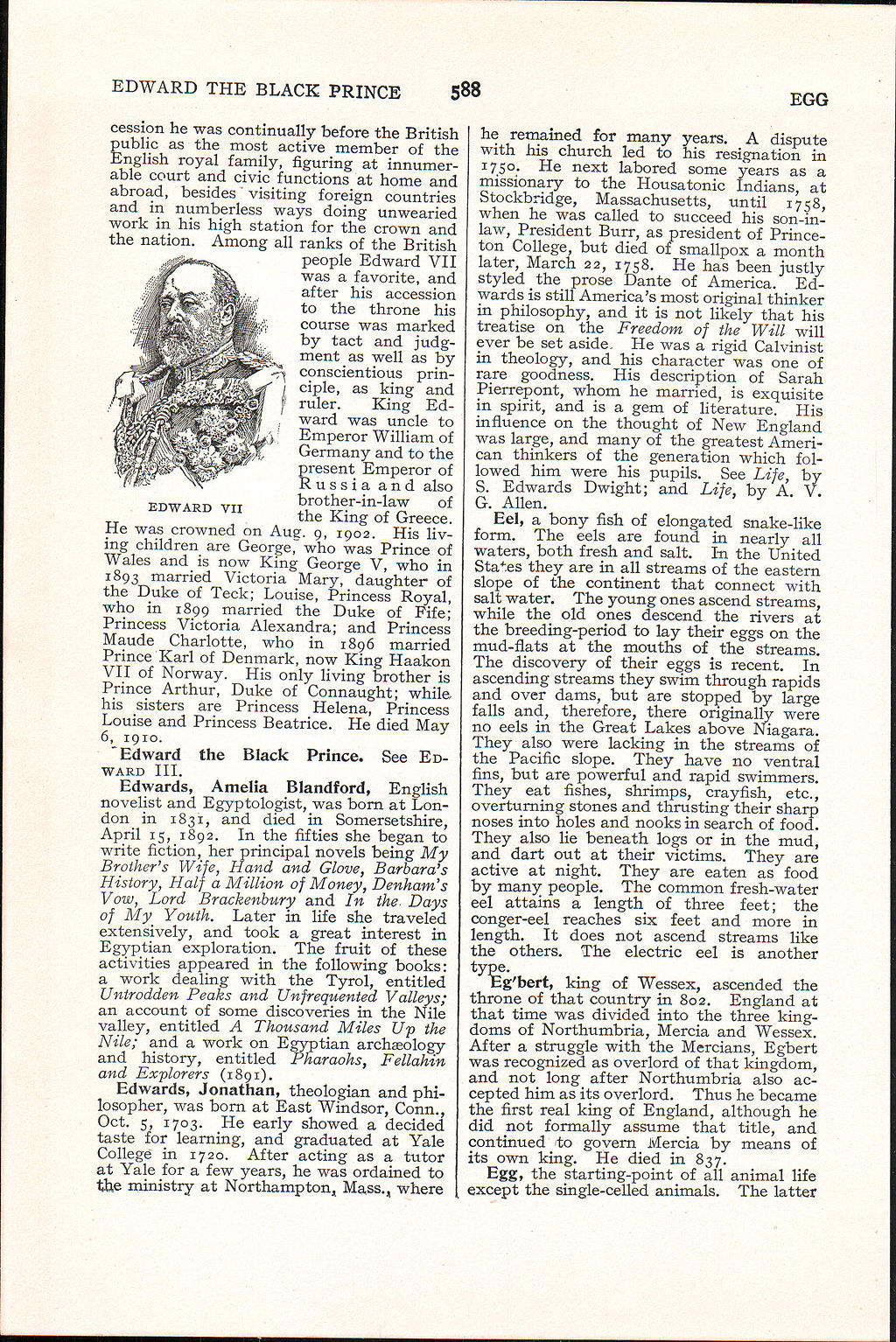EDWARD THE BLACK PRINCE
EGG
cession he was continually before the British public as the most active member of the English royal family, figuring at innumerable court and civic functions at home and abroad, besides visiting foreign countries and in numberless ways doing unwearied work in his high station for the crown and the nation. Among all ranks of the British people Edward VII was a favorite, and after his accession to the throne his course was marked by tact and judgment as well as by conscientious principle, as king and ruler. King Edward was uncle to Emperor William of Germany and to the present Emperor of Russia and also brother-in-law of the King of Greece. He was crowned on Aug. 9, 1902. His living children are George, who was Prince of Wales and is now King George V, who in 1893 married Victoria Mary, daughter of the Duke of Teck; Louise, Princess Royal, who in 1899 married the Duke of Fife; Princess Victoria Alexandra; and Princess Maude Charlotte, who in 1896 married Prince Karl of Denmark, now King Haakon VII of Norway. His only living brother is Prince Arthur, Duke of Connaught; while his sisters are Princess Helena, Princess Louise and Princess Beatrice. He died May 6, 1910.
'Edward the Black Prince. See EDWARD III.
Edwards, Amelia Blandford, English novelist and Egyptologist, was born at London in 1831, and died in Somersetshire, April 15, 1892. In the fifties she began to write fiction, her principal novels being My Brother's Wife, Hand and Glove, Barbara's History, Half a Million of Money, Denham's Vow, Lord Brackenbury and In the Days of My Youth. Later in life she traveled extensively, and took a great interest in Egyptian exploration. The fruit of these activities appeared in the following books: a work dealing with the Tyrol, entitled Untrodden Peaks and Unfrequented Valleys; an account of some discoveries in the Nile valley, entitled A Thousand Miles Up the Nile; and a work on Egyptian archaeology and history, entitled Pharaohs, Fellahin and Explorers (1891).
Edwards, Jonathan, theologian and philosopher, was born at East Windsor, Conn., Oct. 5, 1703. He early showed a decided taste for learning, and graduated at Yale College in 1720. After acting as a tutor at Yale for a few years, he was ordained to the ministry at Northampton^ Mass., where
EDWARD VII
he remained for many years. A dispute with his church led to his resignation in 1750. He next labored some years as a missionary to the Housatonic Indians, at Stockbridge, Massachusetts, until 1758, when he was called to succeed his son-in-law, President Burr, as president of Princeton College, but died of smallpox a month later, March 22, 1758. He has been justly styled the prose Dante of America. Edwards is still America's most original thinker in philosophy, and it is not likely that his treatise on the Freedom of the Will will ever be set aside, He was a rigid Calvinist in theology, and his character was one of rare goodness. His description of Sarah Pierrepont, whom he married, is exquisite in spirit, and is a gem of literature. His influence on the thought of New England was large, and many of the greatest American thinkers of the generation which followed him were his pupils. See Life, by S. Edwards Dwight; and Life, by A. V. G. Allen.
Eel, a bony fish of elongated snake-like form. The eels are found in nearly all waters, both fresh and salt. In the United States they are in all streams of the eastern slope of the continent that connect with salt water. The young ones ascend streams, while the old ones descend the rivers at the breeding-period to lay their eggs on the mud-flats at the mouths of the streams. The discovery of their eggs is recent. In ascending streams they swim through rapids and over dams, but are stopped by large falls and, therefore, there originally were no eels in the Great Lakes above Niagara. They also were lacking in the streams of the Pacific slope. They have no ventral fins, but are powerful and rapid swimmers. They eat fishes, shrimps, crayfish, etc., overturning stones and thrusting their sharp noses into holes and nooks in search of food. They also lie beneath logs or in the mud, and dart out at their victims. They are active at night. They are eaten as food by many people. The common fresh-water eel attains a length of three feet; the conger-eel reaches six feet and more in length. It does not ascend streams like the others. The electric eel is another type.
Eg'bert, king of Wessex, ascended the throne of that country in 802. England at that time was divided into the three kingdoms of Northumbria, Mercia and Wessex. After a struggle with the Mercians, Egbert was recognized as overlord of that kingdom, and not long after Northumbria also accepted him as its overlord. Thus he became the first real king of England, although he did not formally assume that title, and continued to govern Mercia by means of its own king. He died in 837.
Egg, the starting-point of all animal life except the single-celled animals. The latter
